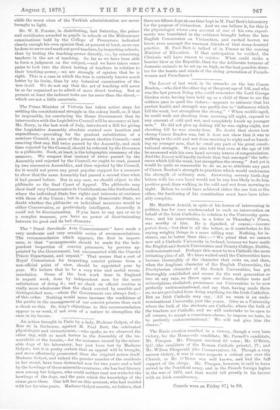The Prime Minister of Victoria has taken active steps for
settling the constitutional struggle in the colony itself, or, if that be impossible, for convincing the Home Government that its intervention with the Legislative Council will be necessary at last. Mr. Berry, in the last week of July, introduced a Bill for giving the Legislative Assembly absolute control over taxation and expenditure,—providing for the gradual substitution of a nominee Council, in place of the present elective Council,—and enacting that any Bill twice passed by the Assembly, and each time rejected by the Council, should be referred by the Governor to a plebiscite. Such, at least, is the telegraphic summary of the measure. We suspect that instead of twice passed by the Assembly and rejected by the Council, we ought to read, passed by two successive Assemblies, and then rejected by the Council, for it would not prove any great popular support for a measure to show that the same Assembly had passed a second time what it bad passed before. But in any case, we should object to the plebiscite as the final Court of Appeal. The plebiscite may show itself very Conservative in Confederations like Switzerland, where the individual State has rights and interests at variance with those of the Union ; but in a single Democratic State, we doubt whether the plebiscite on individual measures would be either Conservative, or particularly intelligent. Assuredly it could not be discriminating. If you have to say aye or no to a complex measure, you have no power of discriminating between its good and its bad elements.


































 Previous page
Previous page